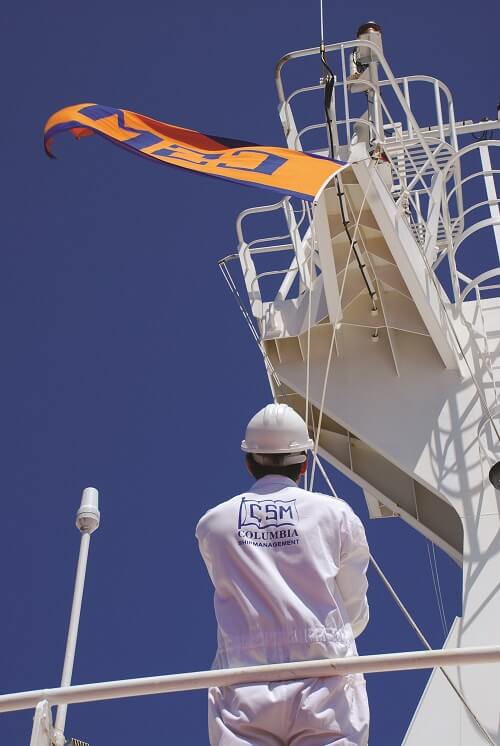Columbia Shipmanagement aims for a larger fleet and footprint in the Gulf Region
With an ambitious objective to have five hundred vessels by 2028, Columbia Shipmanagement (CSM) continues to grow to enhance its fleet and extend the integrated maritime services platform throughout the Gulf region to raise the standards of the market place.
Mark O’Neil, President and CEO of CSM, describes to Robban Assafina the keys to a successful merging in what he calls the “local DNA” of the region, through trustworthy partnerships.
How do you see Columbia Ship Management’s role in the maritime industry?
CSM has evolved from a second-party ship manager to the Columbia group which is an integrated maritime services platform; we offer our clients, internationally, the platform of maritime services like logistics, procurement, catering, e-learning, crew management, technical or commercial management etc. which means providing our clients with a full range of turnkey solutions.
In the area of ship management, CSM ensures to tailor its products according to the individual needs of the clients, as we see many huge ship managers apply a commoditized product to each of their clients. We sit with clients and hear their requirements from the starting point, and we suit it all according to their business whether it is for 100 ships or one ship. Clients want a partnership that provides tailored services, and all the advantages that come with that: technology, investment and optimization.
Ship management has changed massively over the years because clients’ expectations have changed, and we have to be more diverse to meet these changes; for example, we have to embrace technology as the industry has become more technical, and the crew has become much more educated, so we must expand in the e-learning sector to produce the best quality crew.
| Read More: Med Marine gave Robban Assafina a glimpse of the company’s 2023 huge projects |
Speaking of targeting crew enhancement and e-learning, CSM has recently signed an agreement with Abu Dhabi Maritime Academy (ADMA), what can you tell us about this agreement?
We have partners here in the Kingdom as well as in Abu Dhabi, and we believe that the gulf is a fantastic crew rotation location, and while you are rotating crew, why not train them at the same time? There is an opportunity for training and update before or after they join their vessels. So it’s a wonderful opportunity not only for the international crew to be trained in the region, but also for local crews.
What about CSM’s vision regarding the Gulf market, especially with the new office in Saudi Arabia?
We took a decision three years ago, to commit properly to the gulf region. We are very proud of the Saudi office as it will always stay a Saudi office, run by Saudis, for Saudis.
I think vision 2030 can’t be dismissed as a regional aspiration since it’s much bigger than that, with the collective determination in the Kingdom, and the financial strength of Saudi Arabia, a vision like that is truly global in significance and CSM is convinced that vision 2030 will have a global impact and will radically change the political, social and economic world order.
So being in Saudi Arabia is absolutely vital for CSM, and with this office, we will ensure to develop our partnership, since trust is the key to business here. This takes time, commitment, energy and resources, which is starting to pay-off in the region.
As for business, what are CSM’s main goals in the coming period? What can you tell us about CSM’s management fleet?
Our aim is to make CSM’s management fleet bigger as well as extend the integrated maritime services platform throughout the Kingdom to raise the standards of the market place, not by imposing but rather merging our DNA with the local DNA to get new dynamics that are respectful of the considerable learning. So we seek new partners, try to help them have more attractive products and services in the eyes of other big clients, both locally and internationally.
| Read More: ClassNK's New ME & South Asia Regional Manager: A Sound Development of Future Policy & ClassNK’s Methodology |
As for our fleet, it will continue to grow since we have set an objective of five hundred vessels by 2028, which is extremely ambitious. With these partnerships, we can convince our partners and great companies in this region that we are transparently honest and trustworthy so that we will hit this target. Together with Saudi Aramco expanding its offshore activities and the need for new tonnage, this will be achievable.
As the shipping industry is facing a lot of challenges, are we in the process of solving some of the huge challenges?
Looking back, shipping was described as the maritime adventure; it is always developing and dealing with challenges, but it is very flexible and dynamic, as the shipping sector dealt with COVID far better than any other industry. As for the main problems we are facing now, the shortage of people coming into the industry both as seafarers and professionals is one thing, that’s why we have to market more since getting quality people into this field is a big challenge.
Secondly and linked to that, is the need to speak as one; shipping is becoming more sidelined unless we speak with one voice and deal with issues like sustainability, decarbonization and alternative fuels, with one voice on the international stage.
How do you see the Saudi Maritime Congress?
It’s fantastic; the enthusiasm, the ambition and the optimism are all over the place. It’s one of the most enjoyable events since everyone has a smile on their face and is excited about the solutions of the future. We had some very positive conversations that will lead to business opportunities for both sides.
Robban Assafina Magazine, Issue 82, Nov./ DEc. 2022, Maritime Host, p. 91
| Read Here | |
 |
|




































